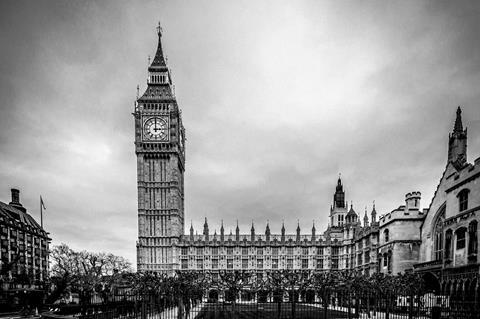After the House of Commons voted to decriminalise abortion and legalise assisted dying in the same week, campaigners are warning that decisions on life and death issues are being taken without proper scrutiny

In the space of three days, Parliament voted in favour of two landmark proposals — one decriminalising abortion, the other to legalise assisted suicide. Both of these monumental decisions marked a significant defeat for many Christians and the pro-life movement in the UK.
On 17 June, MPs passed an amendment to the Crime and Policing Bill to decriminalise abortion in England and Wales. Brought by Labour MP Tonia Antoniazzi, the amendment passed with a landslide 242-vote majority. It removes the possibility of prosecution for women who end pregnancies outside the current 24-week limit, making it the biggest change to abortion law in nearly 60 years.
Just three days later, MPs returned to vote on the Terminally Ill Adults (End of Life) Bill — which passed its third reading with a majority of 23 votes (314 to 291) and now progresses to the House of Lords. The bill would legalise assisted dying for terminally ill adults over the age of 18 who are expected to die within six months.
Mixed opinions
Together, the two decisions have sparked concern among Christians and pro-life advocates — not only for their ethical implications but in the procedure used to ratify the changes. But not all Christian MPs opposed the changes.
Zöe Franklin, Liberal Democrat MP for Guildford, told Premier she supported the Assisted Dying Bill as “safe, compassionate and careful”. While she acknowledged the theological complexities in being a Christian and supporting assisted dying, she admitted, “I do not see a conflict”.
She framed her position through the lens of what she perceives as God’s compassion-driven discontent with a “situation where people suffer in pain, unable to choose to end that pain if they wish to”. Franklin also emphasised the issue of inequality— noting that assisted death remains accessible only to those who can afford to travel abroad.
Catholic MP Chris Coghlan, who also voted in favour, made national headlines after he was denied communion by his parish priest. Ahead of the vote, Fr Ian Vane warned that siding with the bill would amount to “obstinately persevering in sin”.
Two days after the vote, he publicly announced Coghlan’s exclusion from receiving communion at both 8am and 10am Sunday Masses. Though the MP did not attend, he told the BBC that parishioners had contacted him, “pretty appalled” by what had happened.
Poor processes
The two decisions haven’t just been criticised on ethical grounds. Some have also attacked the way these decisions have been made.
In the case of the abortion vote, campaigners point out The Crime and Policing Bill is a broad piece of legislation, allowing for amendments on anything involving criminal sanctions or police powers. Originally intended to address election pledges on issues such as fly-tipping and antisocial behaviour, it had already passed through committee scrutiny when the abortion amendment was tabled. Premier’s Director of Public Affairs Kevin Doran explains this meant the amendment received only “a couple of hours” of debate at the report stage — where parliamentary time is limited.
Given the limited parliamentary time and the fact that, in Doran’s words, the legislation was “hijacked” by Tonia Antoniazzi MP to introduce decriminalisation of abortion, many Christian campaigners and pro-life organisations were likely caught off guard. With little notice and even less opportunity to engage meaningfully in the debate, they were left scrambling to respond to a significant policy shift with profound ethical implications.
Caroline Ansell, a former MP who now functions as Director of Advocacy and Policy at Christian Action Research and Education (CARE) expressed similar concerns about a “major change in legislation” being brought in as “a p.s. to another bill”.
Both the abortion amendment and the private members bill on Assisted Dying were initiatives of individual MPs, not the Government. That left, in Doran’s words, the inherently “inexperienced” intake of new MPs since the last election “to make massive life and death decisions…without any guidance from the government machinery on what unintended consequences there might be from making the wrong choice.”
Speaking of how the Assisted Dying Bill had been brought forward in a Private Member’s Bill, Ansell said “a seismic social change” had happened using “a vehicle more generally used for issues like puppy registration”.
Pills by post
Ansell recognised that the individual cases of women being investigated and prosecuted after traumatic abortions powerfully shaped the debate, outweighing broader public opinion elicited in polling from Right to Life which suggests 62% of the public believe abortion should remain illegal after 24 weeks, and only 1% support abortion up to birth.
She posits that compassion has been misapplied in the debate. “Hard cases make bad law and this certainly applies to abortion decriminalisation. The inverse is also true: bad laws make hard cases.” she said.
Originally introduced during the pandemic and later made permanent, the pills-by-post scheme allows abortion pills to be sent by mail following only a phone consultation — without an in-person medical assessment. Critics argue the system creates legal ambiguity, increases medical risks, and exposes women to the trauma of potentially late-term, self-administered abortions.
“The pills-by-post scheme has led to women obtaining abortion pills very late in pregnancy, with harrowing results for the baby and the mother. This truth has not been heard in the debate,” said Ansell.
The director of March For Life UK, Isabel Vaughn Spruce, says she’s seen the ‘harrowing results’ that Ansell describes: “Teenagers lifting the bed covers and seeing what they described as a horror movie… what they clearly said was a human.”
Unheard voices
Though the assisted dying bill was granted more formal parliamentary time than the abortion amendment, concerns remain about the process.
“Parliamentary time is very limited — particularly when a policy change doesn’t come through a Government Bill,” said Doran. Introduced by Kim Leadbeater MP as a Private Member’s Bill, the legislation has followed a compressed schedule that some argue hasn’t allowed for full debate or scrutiny.
Ansell said the bill’s committee stage — crucial for strengthening and improving the bill — was dominated by MPs whose agenda was to see it passed. “Amendment after amendment that sought to protect the most vulnerable from coercion was voted down,” she said. At the report stage, many further amendments “weren’t even heard or voted on due to a lack of time.”
She expressed further concern about whose voices are missing from the conversation entirely. “Politics can become an echo chamber,” said the former MP. “It occurs to me that the worst harms that will arise from these legislative proposals will be in areas of society too removed from the media and political classes - among people experiencing social deprivation, people who are elderly and isolated, disabled people who don’t have the support they need from the state”
Feeling their voices have been neglected and inadequately represented in Parliament, she said, “It falls to the Church to keep speaking up.”
Apprehensions to the bill are also present amongst the very professionals who would be tasked with administering assisted deaths, should the bill pass in the Lords. As Ansell noted, “The vast majority of palliative care doctors are wholly opposed to assisted suicide and four in ten say they would leave their organisation if it began offering assisted deaths.”
Ansell is among those who worry access to assisted dying will be widened over time – “perhaps even children and people with mental suffering.”
The “right to die” could eclipse the right to life for many of the most vulnerable. She points to Canada, where assisted dying was legalised in 2016 and initially available only to adults with incurable medical conditions. However, subsequent changes to legislation mean people with disabilities and chronic illnesses are now able to end their lives legally.
“Poor, lonely, and homeless Canadians are opting for state-assisted deaths due to their circumstances,” said a CARE report. Cases included a man struggling with addiction, another with mental illness who had previously attempted suicide, and a woman who couldn’t find housing.
What went wrong?
Some pro-life campaigners blame parliament for not allowing enough time for debate. Others have suggested the decisions are to be expected in a parliament made up of a higher number of Labour and Liberal Democrat MPs - parties which have tended to be more liberal on the issues.
But Andy Flannagan, executive director at Christians in Politics, has a different view. “The votes were not lost in one week in 2025”, he says. “They were lost 15 years ago when Christians stepped back from the public square because we didn’t like the things that were going on.”
For Flannagan, the retreat of Christians from public institutions has allowed a “utilitarian, consumerist and autonomised” attitude to flourish in wider society. “Now everything is about my choice and everything is shrunk down to anecdotes.” He says the answer to a culture which emphasies “rights over responsibilities” is for Christians to re-engage with politics. “We have to take the long view,” he says. “It underlines the need for Christians to get involved now in shaping the public square.”
Doran is concerned that in parts of the media, faith-based opposition to assisted suicide was portrayed as “less valid” because it came from a belief system. But writing on premierchristianity.com, ahead of the debate the Liberal Democrat MP Tim Farron pointed out, “It’s odd that otherwise intelligent people have convinced themselves that a ‘non-religious’ worldview is somehow neutral. As if! Everyone’s views are shaped by a complicated mixture of their background, beliefs and assumptions. Nobody operates in a morality-free vacuum.”
Addressing the attempts of some to shove Christians out of the debate, Doran said: “If Christians can’t speak out on life and death issues, then what can they speak out on?”
There is hope
One evangelical leader spoke of the votes being “a kick in the teeth”, and of feeling despondent in the days after the votes. Nevertheless, hope persists.
Isabel Vaughan-Spruce said she feels “strangely hopeful” in spite of the recent votes, pointing to what she perceives as growing momentum within the pro-life movement and a public slowly “waking up to what being pro-abortion really is”.
Ansell echoed the sentiment. “There is always hope,” she said. With scrutiny still to come in the Lords there is the possibility either bill could still be prevented from becoming law. She also pointed to research demonstrating the public’s growing enlightenment to the dangers of such proposals and said charities like CARE would continue to fight, meaning awareness will keep growing.
And for Doran, positives can be drawn from a strengthened inter-faith response to attacks on the freedom to express their beliefs in the public square. “Ironically, the net effect has been that Christians have come together and rallied against attempts to de-legitimise their opinions.”
It seems for many Christians, the votes on abortion and assisted dying represent not only a moral defeat, but a procedural one — rushed through in a manner that offered little space for scrutiny or dissent. Yet within the disappointment lies a renewed resolve. From strengthened alliances between Christian and other faith-based organisations, to a growing realisation that Christians need to be step up and become more politically engaged, this moment may yet prove galvanising.
The outcome of these votes may also serve as a wake-up call to a wider Church that has sometimes ducked the hard issues and become disengaged from political life. The challenge now is not to retreat, but to re-enter the conversation with wisdom, compassion and clarity. If Christians believe that every life has inherent dignity, then the call is clear: to advocate persistently, to participate faithfully, and to speak up — especially when it’s hardest to be heard.





































2 Readers' comments